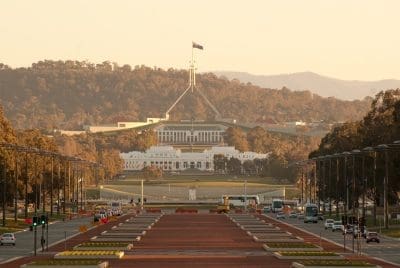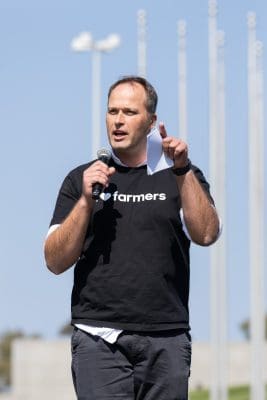Early election projections show the Greens are on track to hold the balance of power in the Senate in Australia’s 48th Parliament.
 Despite potentially losing all of the four seats it held in the House of Representatives before the election, the Greens look set to take 11 upper house seats, the minor party’s equal highest ever.
Despite potentially losing all of the four seats it held in the House of Representatives before the election, the Greens look set to take 11 upper house seats, the minor party’s equal highest ever.
The final Senate results will not be known until at least next week, but at this point it appears Labor will require only the support of the Greens to pass legislation in the new Parliament.
‘”The Greens are now in sole balance of power in the next parliament,” Greens leader Adam Bandt, who is still yet to secure his own lower house seat of Melbourne, said at a press conference on Monday.
“We stand ready in the Senate to make this the most progressive parliament that Australia has seen.”
The new power dynamic means that support for progressive climate and energy policy in the next Parliament will be stronger than the last, Anna Malos and Anna Starbek from Monash University pointed out in The Conversation.
In its first term Labor laid the groundwork for stronger climate action, including legislating an emissions-reduction target.
All signatories to the global Paris Agreement must set 2025 emissions reduction targets by September this year. Labor is waiting on advice from the Climate Change Authority before setting its target. The authority’s initial advice last year suggested a target between 65% and 75%, based on 2005 levels.
Under its commitment to reaching net-zero emissions by 2050, in the last term Labor began developing net-zero plans for each economic sector, including agriculture and land, with the plans due to be finalised this year.
Separately, the Safeguard Mechanism will be reviewed in 2027, during this parliament. The policy aims to reduce emissions reductions from Australia’s biggest greenhouse-gas polluters.
As part of its nature positive plan, the Albanese Government also pledged in its first term to establish a federal Environmental Protection Agency. The proposal was not carried forward following a backlash from Western Australia, but the party has indicated an intention to revive the initiative, as reported by the Australian Financial Review.
The Federal Government has also set a plan to reach 82 percent of Australia’s energy requirements from renewable energy sources by 2030.
It is expected to reach around 50 percent renewable energy this year.
NFF: Ready to work with new Government
 In a statement released on Monday the National Farmers Federation said it stands ready to work with re-elected Albanese Government and the Coalition and independent members to ensure farmers have champions in Federal Parliament.
In a statement released on Monday the National Farmers Federation said it stands ready to work with re-elected Albanese Government and the Coalition and independent members to ensure farmers have champions in Federal Parliament.
“We look forward to continuing our engagement with Prime Minister Albanese and the Ministry team on the issues that matter to farmers and the rural communities they support,” NFF president David Jochinke said.
“When agriculture thrives, so do regional communities and the Australian economy. Not only do Australian farmers feed and clothe Australians, the sector employs over 255,000 people and production is forecast to reach $91 billion this year,” he said.
“Industry and Government have backed the NFF’s Roadmap for agriculture to become a $100 billion industry by 2030, by working together this goal is within reach.
“The NFF and our members want to focus back in on that $100 billion target and work together on a positive plan to grow the industry.”
Mr Jochinke said the election campaign had brought important commitments from Labor, many that reflected priorities put forward by the NFF and its members.
“They’ve backed things like moving on a right to repair, and investing in farm safety, connectivity, and our trade relationships.
“The job for us now is to partner on getting those things done,” he said.
Mr Jochinke said he hoped Labor’s embracing of the idea of a National Food Security Strategy would drive some really positive collaboration between industry and government.
“That piece of work has been a long time coming and with the uncertain state of the world it’s never been more critical.”
Mr Jochinke also acknowledged the Coalition, notably Opposition Leader Peter Dutton and Shadow Minister for Agriculture David Littleproud, for supporting many of the NFF’s election priorities during the election campaign.
He said the NFF also recognised the independents and minor parties elected to the parliament, and will work with these key parliamentary stakeholders over this term.
“Agricultural advocacy isn’t just about working with the major parties,” he said.
“We’ve appreciated independents and minor parties who’ve opened their door to the NFF in recent years.
“We want to build on those relationships and embrace new ones because delivering for farmers depends on having champions right across the Parliament.”
Cattle Australia reiterates seven key policy areas
“As an a-political organisation, CA will continue to advocate on behalf of grass-fed cattle producers to politicians of all persuasions to ensure the needs of our industry are valued in policy debate,” Cattle Australia (CA) Chief Executive, Dr Chris Parker said.
“We look forward to meeting with incoming Members, Senators and the new ministry and shadow ministry, in pursuing the seven key policy areas we campaigned for during the election.
“We call on the new government to:
- guarantee the future of the live cattle export trade to secure the livelihoods of Australian producers and their communities, and improve food security in the region through the reinstatement of the Indonesia Australia Red Meat and Cattle Partnership
- invest $3m to bring a new single dose Q Fever vaccine to market in the wake of rising case numbers in rural areas
- enact truth in labelling laws that protect consumers from plant and cell-grown protein sources being described as meat
- include the biogenic methane cycle in national carbon accounting systems and invest $150 million in research on the role ruminants play to improve environmental outcomes
- deliver an accurate and up-to-date national dataset based on satellite mapping to demonstrate to consumers and trading partners the nature-positive role of agriculture to land use and biodiversity
- acknowledge Buffel Grass as a vital contributor to the economic viability and sustainable profitability of regional and rural Australia, and
- establish a sustainable funding model to support effective biosecurity, traceability and industry system, including user-pays charges on importers.”

HAVE YOUR SAY